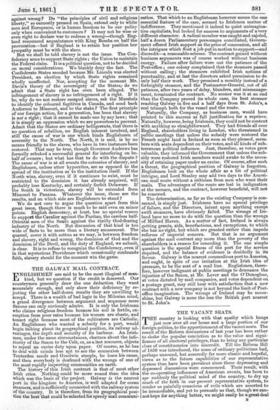THE GALWAY MAIL CONTRACT.
ENGLISHMEN are said to be the most illogical of man- kind, but we question if the credit is deserved. Our countrymen generally draw the one deduction they want accurately enough, and only show their deficiency by re- jecting the other half-dozen results they are unwilling to accept. There is a wealth of bad logic in the Milesian mind, a grand divergence between argument and sequence mere Saxons can only enviously admire. It is only the Irishman who claims religious freedom because his soil is fertile, ex- emption from poor rates because his women are chaste, and tenant right because most of the cultivators are Catholic. Au Englishman who wanted a subsidy for a port, would begin talking about its geographical position, its railway ad- vantages, the depth and security of its harbour. An Irish- man, under the same circumstances, chatters about the infe- riority of the Saxon to the Celt, or, as a last resource, objects to repeal an excise duty upon paper. Of course, as he has to deal with minds less apt to see the connexion between Tenterden sands and Goodwin steeple, he loses his cause, and then everybody is deafened with the wrongs of one of the most rapidly improving communities on earth. The history of this Irish contract is that of most other Irish cries. Nothing could be more sound than the idea which was the basis of the project. Galway is the nearest port in the kingdom to America, is well adapted for ocean steamers, and is sufficiently connected with the railway system of the country. It is therefore, from its geographical posi- tion the best that could be selected for speedy mail communi- cation. That which to an Englishman however seems the one essential feature of the case, seemed to Irishmen matter of indifference. They mentioned it indeed to quiet unimagina- tive capitalists, but looked for success to arguments of a very different character. A radical member was caught and cajoled, half a dozen Parliamentary personages conciliated, Govern- ment offered Irish support as the price of concession, and all the intrigues which float a job put in motion to support—and discredit—a reasonable scheme. The contract gained without business arguments was of course worked without business energy. Failure after failure wore out the patience of the Post-office ; one colony complained that the steamers passed without calling ; the steamers exhibited Irish notions of punctuality, and at last the directors asked permission to do only half their work. They promised a monthly instead of a fortnightly steamer, and the Postmaster-General, out df all patience, after two years of delay, blunders, and mismanage- ment, terminated the contract. No sooner was it at an end than the Company proved its whole case, its best steamer reaching Galway in five and a half days from St. John's, a real triumph both for the vessel and the route. Naturally, the Company, as business men, would have pointed to this success as full justification for a reprieve. Naturally, however, being Irishmen, they could not be content with anything so straightforward. They had friends all over England, shareholders living in London, who threatened in public meetings that unless the subsidy were restored the French might land in Ireland as soon as they pleased, mem- bers with seats dependent on their votes, and all kinds of sub- terranean political influence. Just, therefore, as votes grew valuable, they informed the Government that unless the sub- sidy were restored Irish members would awake to the neces- sity of retaining paper under an excise. Of course, after such a threat, the geographical position of Galway is forgotten. Englishmen look on the whole affair as a bit of political intrigue, and Lord Stanley may add two days to the Ameri- can mail route without a criticism from men who want their mails. The advantages of the route are lost in indignation at the menace, and the contract, however beneficial, will not be renewed.
The determination, as far as the existing Company is con- cerned, is simply just. Irishmen have no special privilege of failure, and the Directors, intent upon anything except swift steamers, have obviously failed. The wrongs of Ire- land have no more to do with the question than the wrongs of Milford Haven. As a matter of fact, Ireland is always getting grants, aids, benefactions, and exemptions, to which she has no:right, but which are granted rather than impede reforms of imperial concern. But that is no argument against the mail contract any more than the poverty of the shareholder, is a reason for conceding it. The one simple question is the special fitness of the port for the service required, and the balance of evidence is decidedly in its favour. Galway is the nearest commodious port to America, and ought, in spite of our irritation at the Irish idea of pressure, to be the seat of a mail line. Englishmen, there- fore, however indignant at public meetings to denounce the injustice or the Saxon, at Mr. Lever and the O'Donoghue, at votes dictated by mail companies, and votes dependent on a postage grant, may still hear with satisfaction that a new contract with a new company is not beyond the limit of Post- office imagination. The wrongs of Ireland may be moon- shine, but Galway is none the less the British port nearest to St. John's.






























 Previous page
Previous page